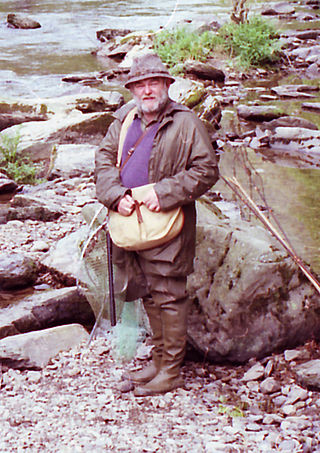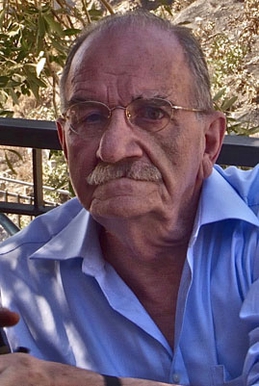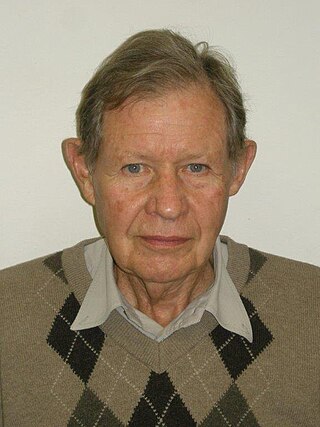
Peter Rolfe Vaughan ACGI, DIC, FREng, FICE, FCGI, MASCE, FGS, was Emeritus Professor of Ground Engineering in the Geotechnics department of Imperial College London.
The Rankine lecture is an annual lecture organised by the British Geotechnical Association named after William John Macquorn Rankine, an early contributor to the theory of soil mechanics.

John Boscawen Burland is an Emeritus Professor and Senior Research Investigator at the Department of Civil and Environmental Engineering of Imperial College London.
Alan Wilfred Bishop was a British geotechnical engineer and academic, working at Imperial College London.
Sarada Kanta Sarma is a geotechnical engineer, emeritus reader of engineering seismology and senior research investigator at Imperial College London. He has developed a method of seismic slope stability analysis which is named after him, the Sarma method.

The Department of Civil and Environmental Engineering is the academic department at Imperial College London dedicated to civil engineering. It is located at the South Kensington Campus in London, along Imperial College Road. The department is currently a part of the college's Faculty of Engineering, which was formed in 2001 when Imperial College restructured. The department has consistently ranked within the top five on the QS World University Rankings in recent years.
Thomas Denis O’Rourke is an American educator, engineer and serves as the Thomas R. Biggs Professor of civil & environmental engineering at the Cornell University College of Engineering. O’Rourke took his Bachelor of Science in civil engineering at Cornell's engineering college in 1970 and his doctorate at the University of Illinois Urbana-Champaign in 1975.

Andrew Noel Schofield FRS FREng is a British soil mechanics engineer and an emeritus professor of geotechnical engineering at the University of Cambridge.
The Sarma method is a method used primarily to assess the stability of soil slopes under seismic conditions. Using appropriate assumptions the method can also be employed for static slope stability analysis. It was proposed by Sarada K. Sarma in the early 1970s as an improvement over the other conventional methods of analysis which had adopted numerous simplifying assumptions.
Harry George Poulos is an Australian of Greek descent civil engineer specialising in geotechnical engineering and soil mechanics, internationally known as an expert on soil behaviour and pile foundations.
David Malcolm Potts is a professor of Analytical Soil Mechanics at Imperial College London and the head of the Geotechnics Section at Imperial College. He has been a member of the academic staff at Imperial College since 1979, responsible for teaching the use of analytical methods in geomechanics and the design of slopes and earth retaining structures, both at undergraduate and postgraduate levels.
Guy Tinmouth Houlsby FREng is Professor of Civil Engineering and former Head of the Department of Engineering Science at the University of Oxford. He specialises in Geotechnical Engineering and more particularly in offshore foundations.
Charles Peter Wroth (1929–1991) was a British civil engineer, a world pioneer in geotechnical engineering and soil mechanics. He led the design and construction of the Hammersmith flyover.
Kenneth Harry Roscoe (1914–1970) was a British civil engineer who made tremendous contributions to the plasticity theories of soil mechanics.
The British Geotechnical Association is a learned 'Associated Society' of the Institution of Civil Engineers, based in London, England, and a registered UK charity. It provides a focal point for organisations and individuals interested in geotechnical engineering.

Nicholas Neocles Ambraseys FICE FREng was a Greek engineering seismologist. He was emeritus professor of engineering seismology and senior research fellow at Imperial College London. For many years Ambraseys was considered the leading figure and an authority in earthquake engineering and seismology in Europe.

David William Hight is a senior consultant at the Geotechnical Consulting Group, a company providing high-level expertise in the field of geotechnical engineering and well known for bridging the gap between research and engineering practice.
The Géotechnique lecture is an biennial lecture on the topic of soil mechanics, organised by the British Geotechnical Association named after its major scientific journal Géotechnique.
David Muir Wood is an academic working in the field of geomechanics and soil mechanics, famous for having pioneered advances in mathematical modelling of soils, informed by experimental observation. The hallmark of his modelling efforts has been to formulate elegant models that capture the essence of the material response while being accessible to practitioners of Geotechnical engineering.

Geoffrey Eustace Blight was a professor in the School of Civil Engineering at the University of Witwatersrand (Wits), serving twice as head of department.







